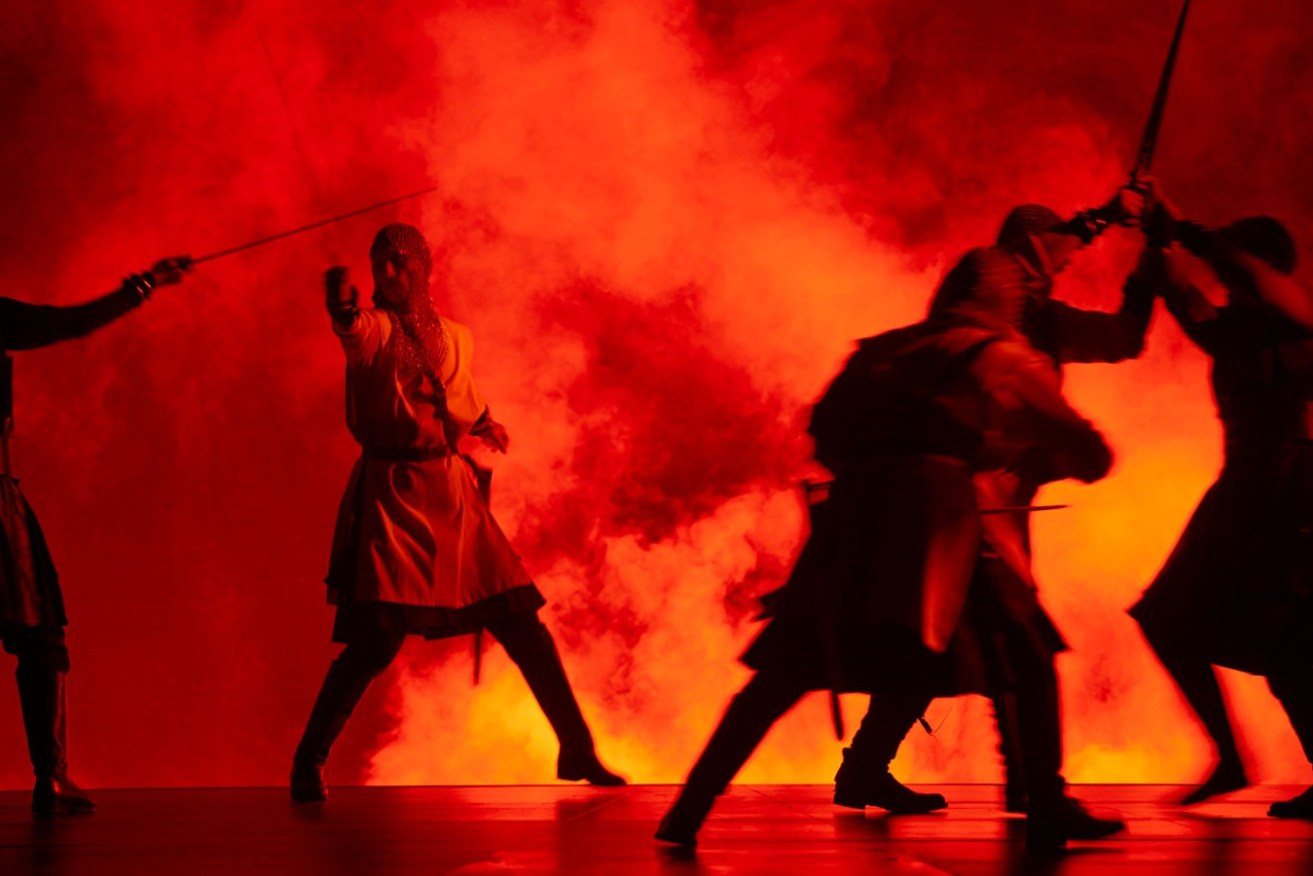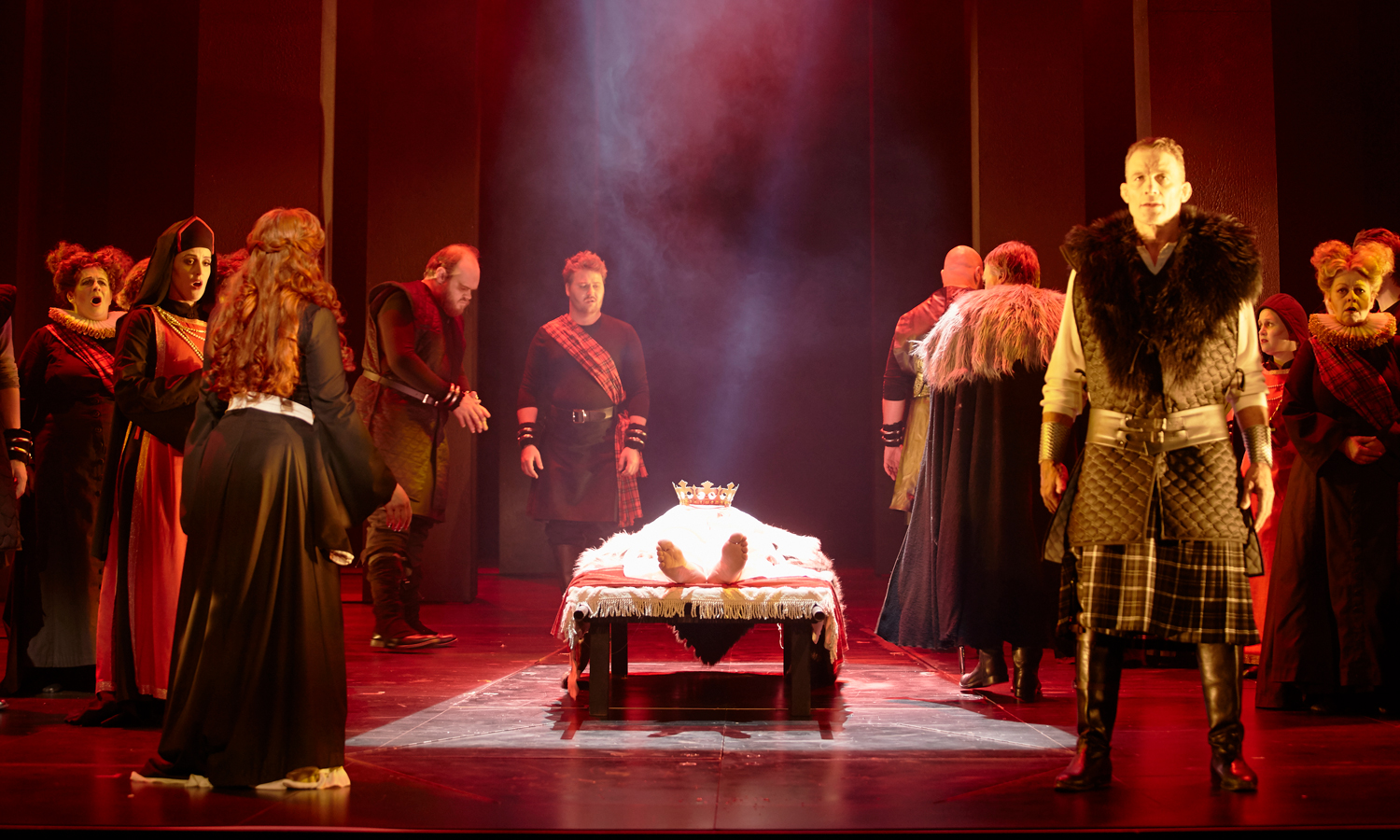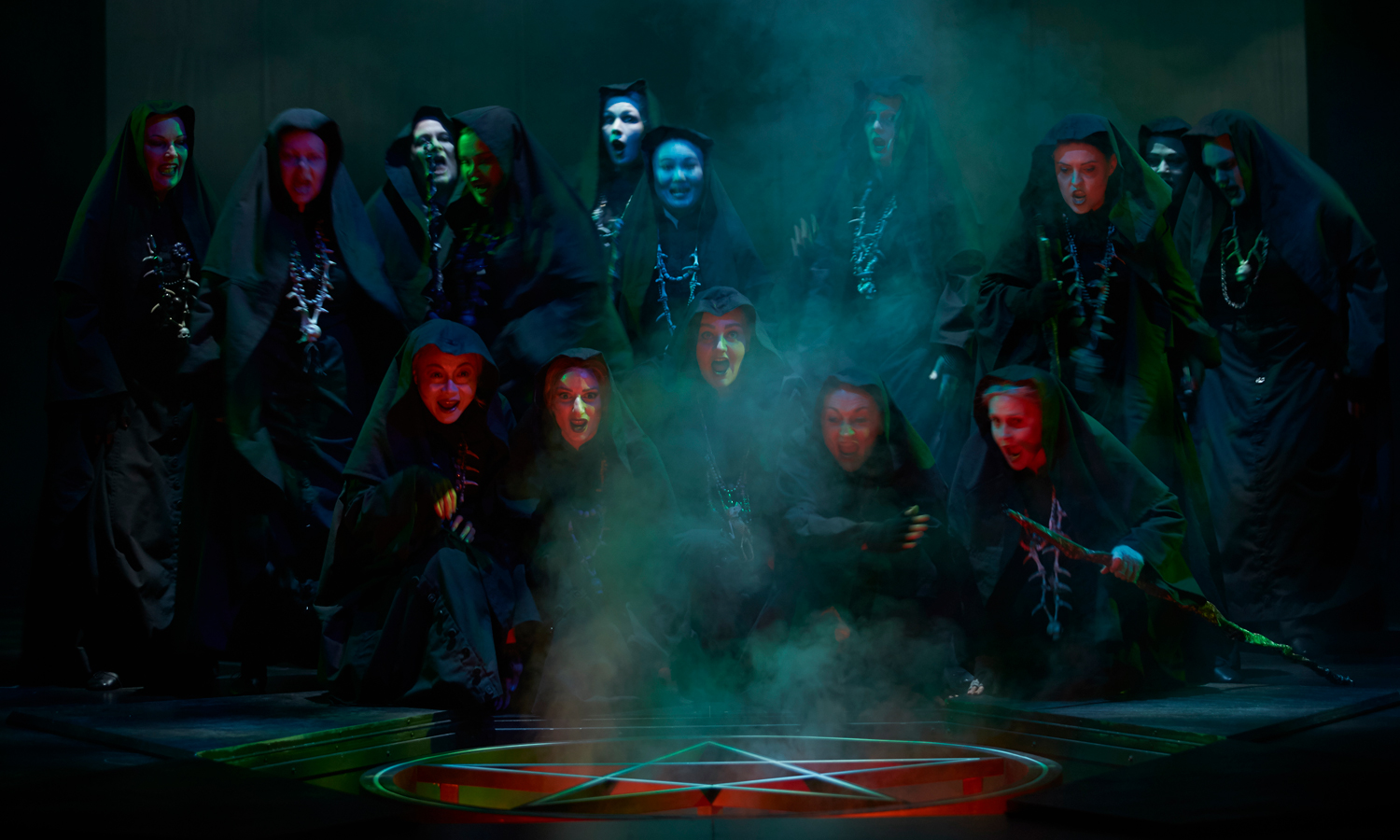Macbeth: An operatic rollercoaster ride fuelled by bloodthirsty ambition
Stuart Maunder’s production of Macbeth for State Opera South Australia promises to be a fearsomely truthful account of Verdi’s dramatic masterpiece, performed with some of Australia’s finest singers on a set reminiscent of Game of Thrones.


Bold sets and Game of Thrones-inspired costumes add to the dramatic intensity of the State Opera South Australia and West Australian Opera co-production 'Macbeth'. Photo: James Rogers / West Australian Opera
“You are an ambitious soul, Macbeth. You long for greatness, but will you be wicked enough?”
So asks Lady Macbeth, soon after the curtain rises in Verdi’s supercharged operatic interpretation of Shakespeare’s tragedy.
“The road to power is filled with crimes, and woe to him who sets an uncertain foot upon it and retreats!” she declares.
Fate works its own inimitable way until Macbeth buries his dagger into King Duncan’s stomach to fulfil this narcissistic couple’s plans to rule Scotland.
Whether it depicts evilness, madness or reality, Macbeth knows no bounds as a description of human nature; and as Verdi’s first opera based on a Shakespearean play, it was his early masterpiece.
“L’opera senza amore!” is how audiences first described Macbeth at its premiere at Florence’s La Pergola theatre in 1847. Pioneeringly in it, Verdi replaced all ideals about romantic love with a more sinister study into human motivations: achieving absolute power by any ends.
Some directors have a field day relocating Macbeth into the modern era by depicting the Scottish warrior as some sort of contemporary, power-hungry political figure or military dictator. Not so Stuart Maunder. As the director of State Opera South Australia’s forthcoming production of Macbeth, he sees it as his prime duty to find all this opera’s dramatic truths from within.
“I’m not rewriting Macbeth,” he tells InReview of the show, a co-production with West Australian Opera that was originally to be presented in Adelaide in 2020 but had to be rescheduled due to the pandemic.
“I believe we’re intelligent human beings, and that we can make the leap ourselves.
“I hate anachronisms. I’m not forcing people to see Dan Andrews in it, or Joh Bjelke-Petersen, or Putin. To make it as specific as that, for me, robs the piece of its universality. Such connections are for later, if we choose to think about it.
“If viewers stop for moment to question what you are doing in the theatre, you’ve lost them, and you might never get them back. What a director instead needs to do is take people on a rollercoaster of a ride and let them take from it what they can. Otherwise you’re rewriting the story.”
Maunder, accordingly, chooses not to shy away from depicting knights, assassins and witches on stage – all the characters of chivalric Scotland as present in Shakespeare’s play and this opera.
Costumes and sets will be historical in overall look, he says.
“If I could describe it using modern equivalents, the feel of the piece is very much like Game of Thrones, with sets that look like a Bauhaus concrete bunker, where columns move in and out to project a sort of Iron Age rawness.”

A scene from the West Australian Opera season of Macbeth. Photo: James Rogers
His aim, Maunder explains, is not to create a period piece but rather to convey through truthfulness the original work as it appeals to the audience’s imagination.
“If you’re going to say the word ‘traditional’, I’ll go with that to a certain extent, although that word always conveys an underlying feeling that a production is not as vibrant in some way.
“Alan Jay Lerner, the great playwright and director of Camelot and My Fair Lady, said that what he loved about [director] Moss Hart was that he put on stage what the author had written tastefully, truthfully and theatrically. He didn’t intrude, he guided. I believe that is our job.”
Creating a truly realistic, persuasive Lady Macbeth is key to this opera’s success on stage, Maunder thinks, because she holds a prime significance in the libretto Francesco Maria Piave wrote for Verdi, after Shakespeare’s 1606 play. Piave draws her even more starkly than Shakespeare. In the famous sleepwalking scene, she doesn’t so much wrestle with her conscience as descend into pure madness.
“I may be putting myself in the hands of all the feminists out there, but it is Lady Macbeth who has this lust for power. There’s a real sense that she drives him. Sure, he goes along with it, but he is always the one who reflects. She reflects not at all.
“The traditional self-sacrificing role of the female is not just present in Macbeth. We may all imagine that Macbeth is the incredibly bloodthirsty one. But it is Lady Macbeth who is the dominant, controlling one.”
This is why Maunder prefers the 1847 version of Verdi’s opera rather than the later one the composer adapted for the Paris theatre in 1865. Dramatically it is stronger, he suggests.
“What I love about the earlier one is that it’s got this raw energy. It just doesn’t let up. There is no moment to luxuriate in beauteous sound or anything like that.”
“The great Sleepwalking Scene is exactly the same in both versions. But Lady Macbeth becomes more of a lyric soprano in the 1865 version, whereas in the first version her role is much wilder and she sings in a mad, almost coloratura way.”
Macbeth is an anti-hero… there is also a tragic human side to him
Macbeth’s remorselessly distilled power in this earlier version represents Verdi at his absolute best, says Maunder.
“I adore the piece because he was starting to rattle the cage of conventions. He realised that everything doesn’t have to be in aria-cabaletta form with big ensembles. He really mixed it up.
“If you listen, for instance, to the way he has orchestrated the appearance of the kings in Act Three, there is a hollow, bagpipe quality from the band positioned behind the stage – it is weary and quite frankly spooky. The finale is like William Tell quality with trumpets blaring, choristers racing around and swordfights going on.”
The role of Macbeth himself is a harder one to achieve, Maunder says, because there is a deeper complexity and contradictions within his character.
“Macbeth is an anti-hero. He is absolutely a mass murderer, a serial killer, and all the rest. But there is also a tragic human side to him. He has a tragic flaw inside all of us. He is the one who questions whether a dagger appears, what fate holds.
“It’s another one of the other reasons I love the 1847 version, because it actually finishes with a soliloquy for Macbeth. This, of course, doesn’t happen in Shakespeare, and it was removed from the Paris version of the opera. But it is central, because it helps Macbeth achieve some degree of nobility in the end.”

Macbeth’s chorus of witches. Photo: James Rogers / West Australian Opera
Maunder waxes lyrical about the singers he has procured for this Adelaide production.
“The female protagonist is played by Kate Ladner,” he says. “She is one of Adelaide’s favourite daughters and has had great success singing Lady Macbeth. She showcased it beautifully at the Buxton Festival (in Derbyshire, England) under the direction of Elijah Moshinsky – it was one of the last productions Elijah did before his death.
“In José Carbό, you’ve got probably Australia’s most respected and revered Verdi baritone. He is a singer at the absolute pinnacle of his powers at the moment. He’s a very charismatic performer, which is exactly what you need for Macbeth, because in a sense you’ve got to root for him – which is hard for an audience if the person isn’t automatically charming.”
Pelham Andrews, meanwhile, takes the role of Banquo, Macbeth’s ally. Maunder rates this Adelaide singer as “one of Australia’s great basses”, saying we are lucky to have him in here, and that he has unrivalled stage presence.
“In reality, he is the most charming, sympathetic man in the world but who happened to play the monster in Watershed [– The Death of Dr Duncan]. In Macbeth, he gets to play the quintessential good guy, the father of the whole new line of Scottish kings.”
State Opera’s Macbeth, directed by Stuart Maunder and featuring the Adelaide Symphony Orchestra under conductor Finnegan Downie Dear, runs from September 7-16 at Her Majesty’s Theatre.
This article is republished from InReview under a Creative Commons licence. Read the original article.
InReview is an open access, non-profit arts and culture journalism project. Readers can support our work with a donation. Subscribe to InReview’s free weekly newsletter here.
![]()




